Kevin Clarke
Operetta Research Center
3 July, 2023
The works of German pre-WW1 composers have only recently come back into focus again – as opposed to the better-known jazz and revue operettas from Berlin in the 1920s. Now, the Operetta Archives of Los Angeles have released the first recording of Walter W. Goetze’s Wenn Männer schwindeln (“When Men Fib”), a 1913 three-acter that is announced as the start of a series of rarities with the same creative team: next up will be Paul Abraham’s Der Gatte des Fräuleins, Der Bauerngeneral by Oscar Straus, and then Das süße Mädel by Heinrich Reinhardt.
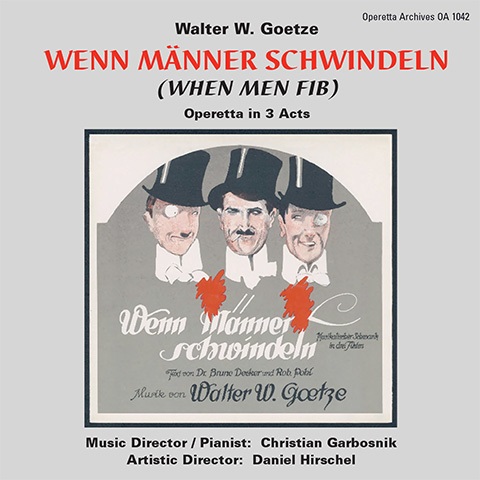
CD cover for “Wenn Männer schwindel”. (Photo: Operetta Archives)
The series is initiated und supervised by operetta historian Daniel Hirschel, based in Leipzig/Germany. He has gathered a group of young singers and conductor/pianist Christian Garbosnik from Staatsoperette Dresden to record the forgotten Goetze show. Mr. Hirschel himself joins the cast as a sort of character tenor and speaker/narrator.
Walter Wilhelm Goetze (1883-1961) started his career as a pianist at Berlin’s cabaret Pêle-mêle, worked as a conductor at various other theaters before presenting his own chansons for the first time in 1911 at Berlin’s Intimes Theater (Intimate Theater).
His writing partner for his first stage work, Parkettplatz Nr. 10, was the famous Hermann Haller. In 1913 Goetze’s Vaudeville Zwölf und Eins premiered in Leipzig, the same year the “musical farce” Wenn Männer schwindeln was first shown in Halberstadt, a smallish town in Saxony-Anhalt. Not exactly the center of the operetta universe. But the CD booklet tells us that more than 100 theaters performed the show elsewhere in the years that followed, including venues in Vienna and Amsterdam. So it was a success, of sorts. (The online archive of Theatermuseum Vienna lists no images for Goetze or Wenn Männer schwindeln, sadly.)
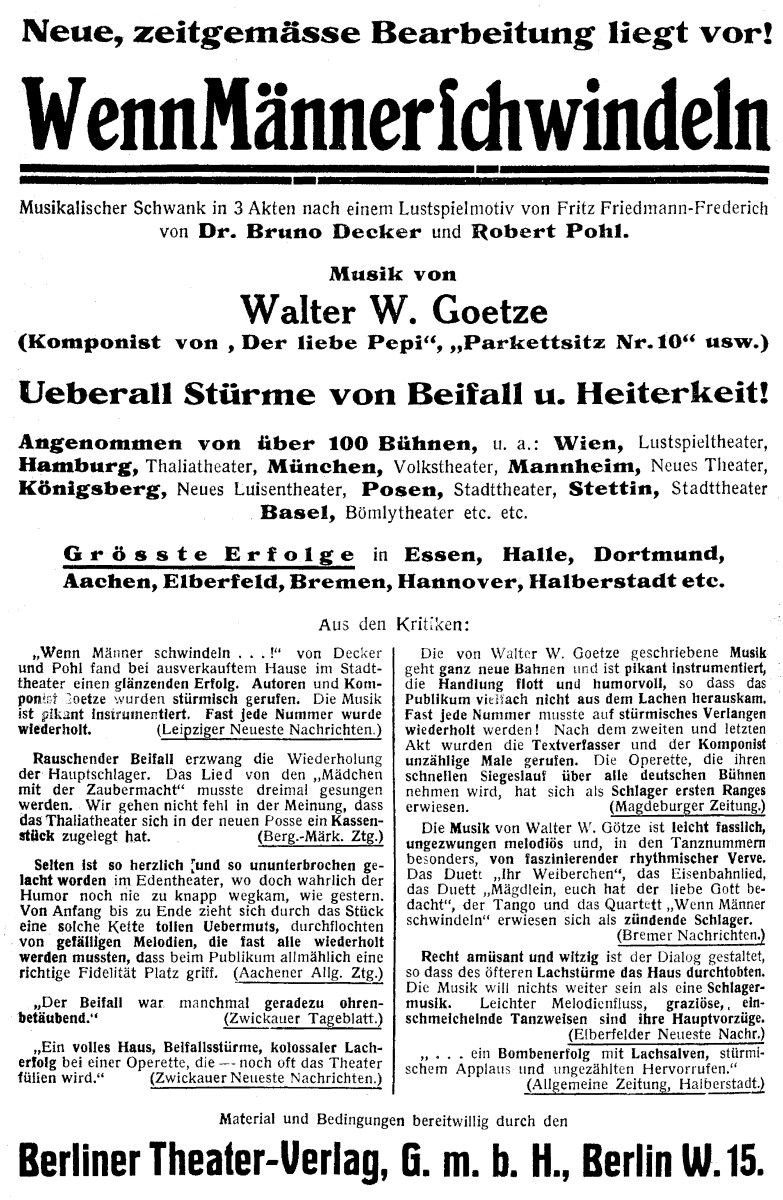
Advertisement by Berliner Theater-Verlag for “Wenn Männer schwindel”. (Photo: Operetta Archives)
The show tells the story of amorous chaos in an upper-class household, a bit like Wiener Blut where everyone side-steps with everyone. Here the action takes place during the carnival season, and judging by the names of the characters it’s all set in Paris, or at least France. There’s lusty maid à la Adele called Georgette, flirting with a police officer who admires her, there’s a master of the house, Ernest Favart, who is bored with married life and so on and so on. The story revolves around an invention called a “Notbremse” (emergency brake), the details are complicated and laid out in full in the booklet in a German and an English text.
The three singers plus Daniel Hirschel present their 15 numbers with excellent diction, and they are all blessedly un-operatic, giving them a much more natural sound than what you might be used to from cpo recordings. There is Karol Bettley as Ernest Favart, Nicole Meinhardt as Rose and Georgette, Kathrin Duschek as Leonie and Yvonne. Mr. Hirschel plays Larouse, Octave, Lafleur and the Speaker/Narrator. They might all not sound like typical opera singers, even if some work with opera companies, but they also don’t sound like triple threat musical comedy people either. It seems difficult for them to move away from clear vocal lines and “act” their parts. The only one who does this, pointing in the right direction, is Mr. Hirschel himself, even if he’s only an amateur actor with a palpable operetta passion.
A Sense of Drama and Plot Development
The truly remarkable aspect of this recording is the brilliant piano playing of Mr. Garbosnik who really makes the music come alive with a keen sense for rubato and bounce. The lyrics by Bruno Decker and Robert Pohl don’t come across as particularly inspired – or naughty (given the libidinous subject matter). If you don’t speak German, you’ll basically hear 15 tracks with freshly played tunes but with little sense of drama or plot development.
It’s a CD mostly for connoisseurs interested in discovering little-known repertoire from an era that has been neglected by researchers and stage directors for the longest time. So, a huge thank you to Mr. Hirschel for putting a spotlight on it!
Goetze himself had greater hits later in his career, among them Ihre Hoheit die Tänzerin (1919), Adrienne (1926) and Der goldene Pierrot (1934), the latter successful in Nazi Germany.
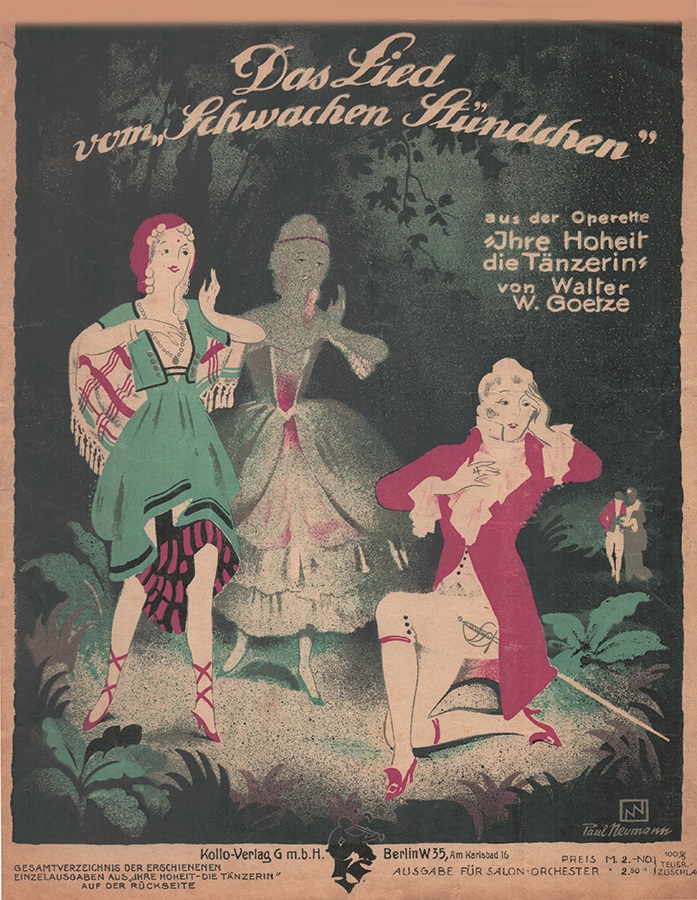
“Das Lied vom ‘Schwachen Stündchen’” (Tee Song from the weak/seductive hour) from Goetze’s “Ihre Hoheit die Tänzerin”. (Photo: Kollo Verlag / Operetta Archives)
Compared to the music of Jean Gilbert or Walter Kollo, Paul Lincke or Victor Hollaender, Goetze’s style is less ‘modern’ and ‘flashy’. The booklet tells us he was aiming at a more ‘refined’ operetta style, though some of the march-rhythms heard in Wenn Männer schwindeln clearly point in the Lincke direction. Only that Lincke did it with more international success.
The sound quality of this recording is excellent, the booklet doesn’t say where the recording was made, but wherever that might have been – it’s a winner. Perhaps Mr. Hirschel can try to find better singing actors for his next endeavors with Abraham, Straus and Reinhardt, who bring more vocal individuality to this series? It would be well worth the search.
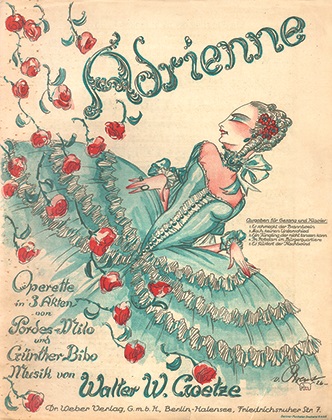
Sheet music cover for Goetze’s “Adrienne”. (Photo: Operetta Archives)
Further Upcoming Projects
All in all, it’s more than laudable that researchers such as Daniel Hirschel have managed to find a partner in the Operetta Archives to release such a recording internationally. The excellent and well-illustrated booklet contains no lyrics. So you’ll have to figure out yourself what everyone is singing.
We are told that the next CD which Operetta Archives will release – outside of the Hirschel series – will be a complete recording, with piano accompaniment, of Will Anderson’s 1919 musical Take It from Me. It should be out in September.
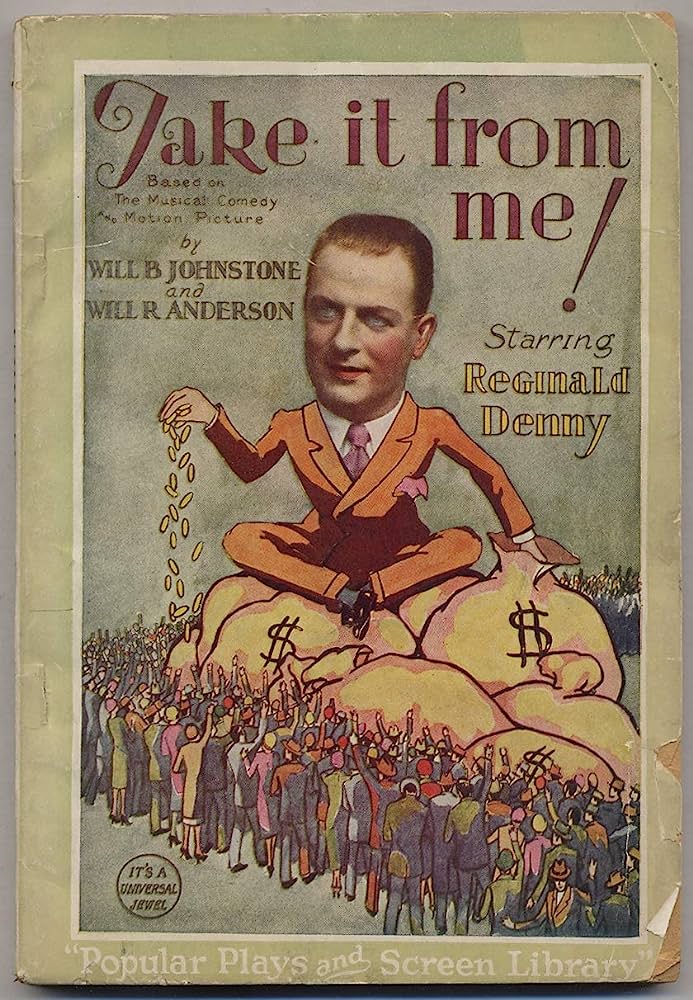
Will Anderson’s “Take It from Me”. (Photo: Jacobsen-Hodgkinson Corporation)
By the way, Goetze continued composing after WW2 and premiered his Liebe im Dreiklang in 1950 in Heidelberg. He died, 11 years later, in Berlin. Many of his better-known shows have been recorded by Franz Marszalek with the WDR in the 1950s and are available on disc today. There have been no stage performances of Goetze’s works after the 1960s, the CD booklet for Wenn Männer schwindeln tells us. Whether this world premiere recording will change that remains to be seen.
For more details and to order the CD directly from the Operetta Foundation and its Archive, click here.

Many thanks for Your review!
European operetta enthusiasts can order the cd very soon from jpc.de or via email from buffomania@gmail.com
Many thanks for Your kind words and Your support by talking about on Your great website !!!
GATTE DES FRÄULEINS and BAUERNGENERAL have been recorded quite completely and shall release at the end of this year. In between we startes rehearsing the 1912 smash hit of a Swiss operetta and LE SIRE DE VERGY. 2024 will be dedicated to works from Norway and Finland. Further we will stage scenic versions of one-acters by Hervé and Frédéric Barbier and preparing a concert “Wir reisen um die Welt” with music from Norwegian, Swiss, French, Brazilian a.o. operettas from all over the world connected with recitation from works by Mark Twain, Jules Verne a.o. Check out our website http://www.buffomania.com